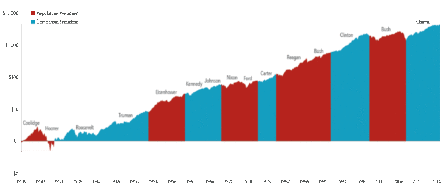The Presidential Election and your Investments
Last night, I listened to a commentator call the election an existential moment: deciding the fate of our country and proclaiming that the wrong choice would be ruinous and a disaster. Let me be clear also that I’ve heard way too much of this kind of talk from both sides of the political spectrum.
Politically, our nation has become much more polarized and partisan. Historians will argue about the causes, but there are side effects. Humans are naturally biased to seek information that supports our preexisting beliefs, and this is reinforced by highly focused media that tailors their content to drive higher engagement (and thus higher profits). Rather than seeking opposing viewpoints, we are drawn deeper and deeper into a media ecosystem designed to reinforce our established world view.
The result is that a LOT of people are VERY concerned that if their side doesn’t win the election, it means the end of the United States. More immediately, the question I get frequently is “what will happen to my portfolio if _________ wins?”
First, Focus on the Fundamentals.
In the short run, investors can be spooked by surprises they hadn’t considered or situations they thought were unlikely. The sharp reactions to the United Kingdom’s vote to leave the European Union (BREXIT) is a classic example of a negative surprise. But investors soon looked past the surprise, re-evaluated the economics and the likely impacts on company earnings, and adjusted their expectations accordingly. The result was that after a few days of volatility, markets quickly recovered. Investors who sold in panic were left behind.
Investors focus on fundamentals like inflation, economic growth, corporate earnings, etc. While the recovery since the 2008 financial crisis hasn’t been particularly inspiring, the U.S. has led the rest of the developed world in terms of economic growth, corporate profits, bank lending, etc. Nationally, employment is almost back to pre-crisis levels, though clearly there is still room for improvement. Inflation has been a big concern, but hasn’t really shown up in the data so far. Company profits have set new records, as have the prices for stock market indexes like the S&P 500.
At the end of the day (or week), these are the factors that will drive stock prices higher (or lower), and right now, the fundamentals look fairly solid.
Which candidate is better for the investment markets?
Dimensional Fund Advisors has a great chart showing the growth of a dollar across the 15 presidents since 1926. It shows that there is basically no party or president that is ‘better’ for investors. In fact, U.S. Presidents are often given far more credit (or blame) than they deserve for the economy. Their policies can affect some aspects of the economy, but they do not work alone, either. Congress has a significant impact through Federal spending (or belt-tightening).
Figure 1. Growth of $1 since 1926, Source: Dimensional Fund Advisors

Investing for the Long-Term
I don’t want to downplay the importance of the Presidential election. There are many aspects of the presidency which can have a tremendous impact on the country. But one election is unlikely to cause an existential crisis for the country, and investors need to be focused on the underlying strengths of the economy and corporate America. Trying to time a potentially market moving event like an election is unlikely to be successful, as it requires several correct decisions about how the event will unfold, which investments to buy or sell, and when to place those trades.
History provides little evidence that people are able to do this kind of short-term market timing successfully and consistently. And emotion is a very unreliable tool for investing. A far more reliable strategy is to decide on an investment mix that you can live with for a long time, hold your investments over 10 or 20 years and ride out the day-to-day volatility. And periodically rebalance to take advantage of other’s emotional reactions.
This column is prepared by Rick Brooks, CFA®, CFP® and Jon Beyrer, CFP®, EA. Brooks is Director/Chief Investment Officer and Jon is Director/Wealth Management with Blankinship & Foster, LLC, a wealth advisory firm specializing in comprehensive financial planning and investment management. Brooks can be reached at (858) 755-5166, or by email at brooks@bfadvisors.com. Brooks and his family live in Mission Hills.
Category: Business, Local News







